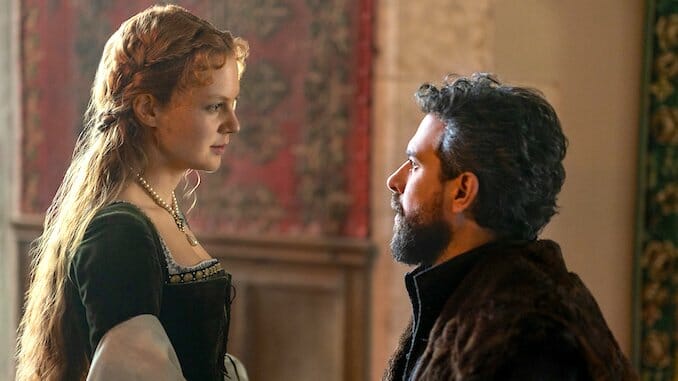Becoming Elizabeth: Starz’s Drama Refreshingly Presents a Tudor Queen Full of Teen Dreams
Photo Courtesy of Starz
With Starz as our guide, we have marched through the years among the Wars of the Roses, starting with King Edward IV and Elizabeth Woodville in the 15th century (The White Queen), to the reign of Henry VII and Elizabeth of York (The White Princess), onto the rise of young Henry VIII and his early romance with Catherine of Aragon (The Spanish Princess), and now we meet the Tudor Queen Elizabeth I (Becoming Elizabeth). The first installments lightly followed the novel series by Philippa Gregory, which focused on women in the historical background who deserved more attention for their influence and agency. But now that we’ve reached Elizabeth I, the most well-documented woman of Tudor England, the primary question becomes: what new perspective is there to see here?
Becoming Elizabeth creator Anya Reiss has managed to find one by spotlighting an Elizabeth who has not yet come to power and is still very much finding herself. When we meet her here, her father Henry VIII has just died, leaving an enormous power vacuum in the English court. Henry had three living children: Mary (Romola Garai), the daughter of his first wife Catherine of Aragon; Elizabeth (Alicia von Rittberg), the daughter of Anne Boleyn; and Edward (Oliver Zetterström), now King Edward VI, the son of Jane Seymour.
The eight-episode series (four episodes of which were available for review) picks up immediately in the midst of chaos. Edward, the only son, is obviously elevated as King—but he is also just 11 years old. He has been raised by his stepmother, Catherine Parr (Jessica Raine), and is fond of her and his uncle Thomas Seymour (Tom Cullen), who Catherine weds as soon as Henry is in the ground. This would-be power couple seek to wield influence over the new king, but are thwarted in a quick power play by Thomas’ older brother Edward (John Heffernan), who has the young ruler name him Lord Protector.
To regain lost ground, Thomas and Catherine invite Elizabeth to come and live with them; she is only 14 at the time, and impressionable. More importantly, she is not Catholic like her older sister Mary (the young King Edward is staunchly Protestant, and religious friction is a dominant subplot). Almost immediately, though, the handsome and charismatic Thomas begins flirting with Elizabeth, even in front of his new and supposed beloved wife. And Elizabeth, flattered, flirts back and starts to fall in love.
Crucially, Becoming Elizabeth understands from the start that the “relationship” between Thomas and Elizabeth (a matter of historical uncertainty that the show makes explicit) is problematic. Catherine at first plays along, believing that Thomas—a man of almost 40—is just teasing Elizabeth in order to win her to their side, so that they can manipulate her. But as quickly becomes clear, Thomas’ motivations are even more nefarious, and while his attraction to Elizabeth may play out as a romance from her side, to everyone else (viewers included), it is unquestionably scuzzy.
Like the series that came before it, Becoming Elizabeth has a lot of table setting to do and a lot of ground to cover to explain who everyone is, what their motivations are, and who is trying to backstab who, when, why, and how. Though Wikipedia is often a helpful resource when watching dense historical series, Becoming Elizabeth does an admirable job of eschewing that need by having characters speaking plainly (if in hushed whispers) in a way never feels like rote exposition. The thing about court intrigue is that it is intriguing—there’s a reason why George R.R. Martin took this time in English history and its many political twists as the basis for his Game of Thrones saga.
-

-

-

-

-

-

-

-

-

-

-

-

-

-

-

-

-

-

-

-

-

-

-

-

-

-

-

-

-

-

-

-

-

-

-

-

-

-

-

-








































